2023届高三英语二轮复习动词的分类及用法课件(18张PPT)
文档属性
| 名称 | 2023届高三英语二轮复习动词的分类及用法课件(18张PPT) |  | |
| 格式 | pptx | ||
| 文件大小 | 4.3MB | ||
| 资源类型 | 教案 | ||
| 版本资源 | 通用版 | ||
| 科目 | 英语 | ||
| 更新时间 | 2022-12-04 20:47:45 | ||
图片预览

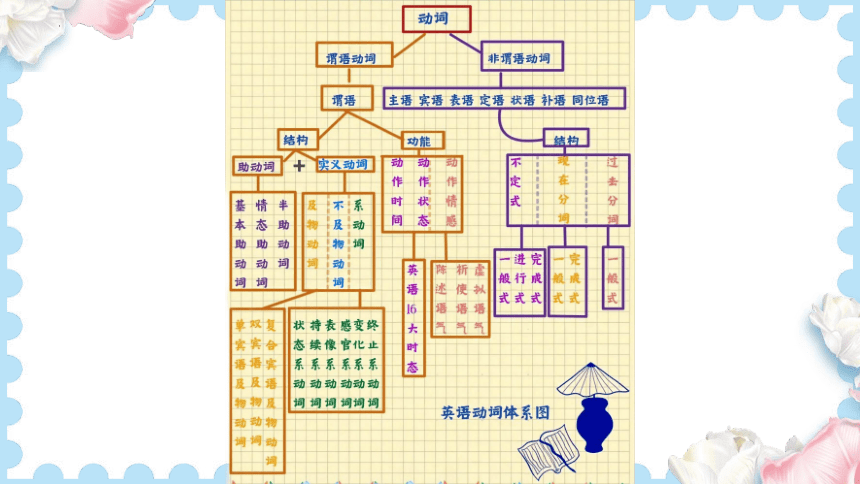
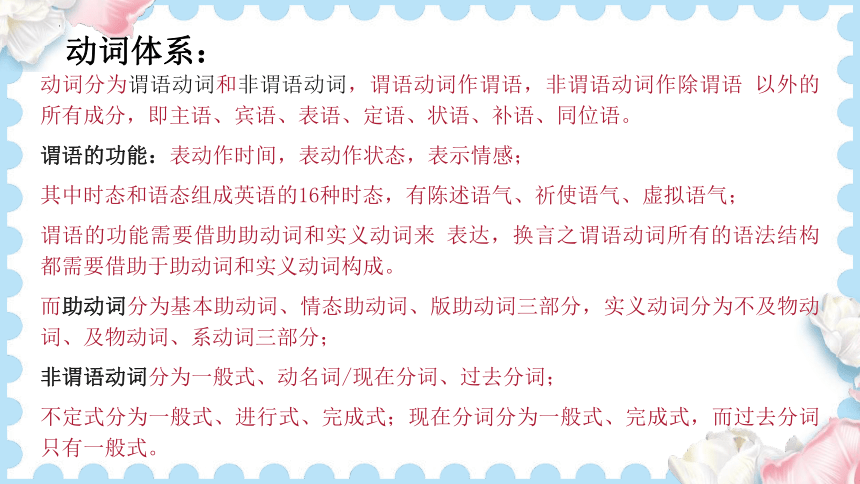
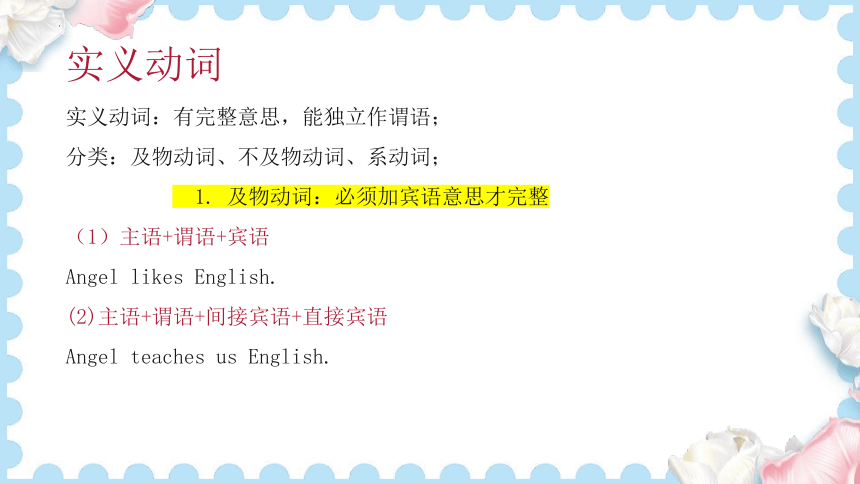
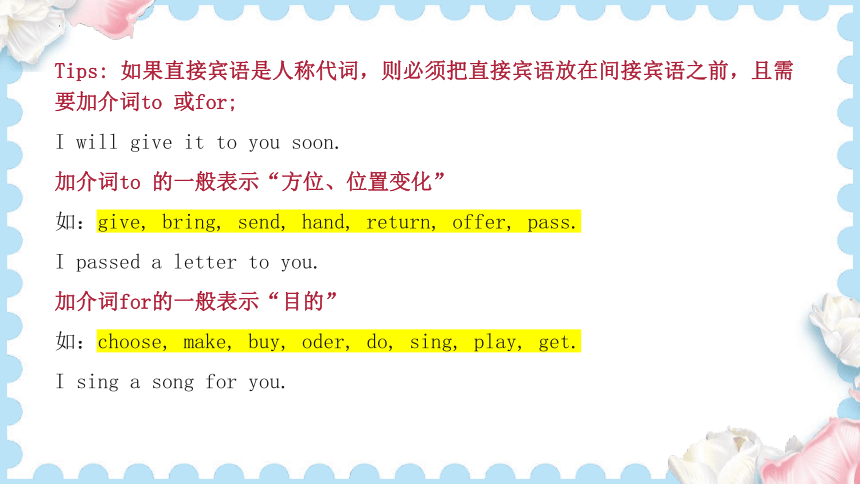
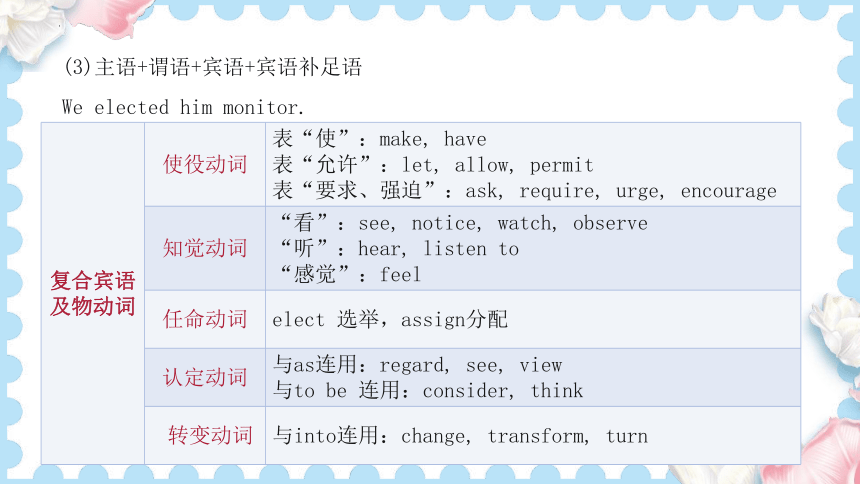
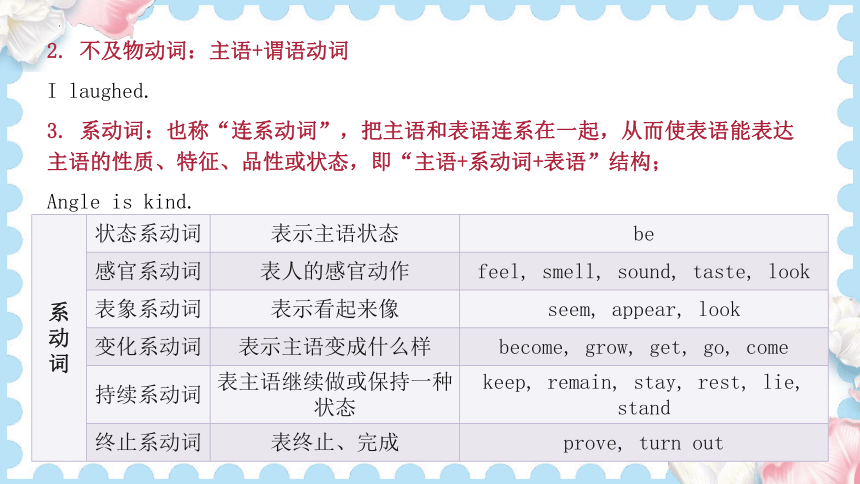
文档简介
(共18张PPT)
动词
动词体系:
动词分为谓语动词和非谓语动词,谓语动词作谓语,非谓语动词作除谓语 以外的所有成分,即主语、宾语、表语、定语、状语、补语、同位语。
谓语的功能:表动作时间,表动作状态,表示情感;
其中时态和语态组成英语的16种时态,有陈述语气、祈使语气、虚拟语气;
谓语的功能需要借助助动词和实义动词来 表达,换言之谓语动词所有的语法结构都需要借助于助动词和实义动词构成。
而助动词分为基本助动词、情态助动词、版助动词三部分,实义动词分为不及物动词、及物动词、系动词三部分;
非谓语动词分为一般式、动名词/现在分词、过去分词;
不定式分为一般式、进行式、完成式;现在分词分为一般式、完成式,而过去分词只有一般式。
实义动词
实义动词:有完整意思,能独立作谓语;
分类:及物动词、不及物动词、系动词;
1. 及物动词:必须加宾语意思才完整
(1)主语+谓语+宾语
Angel likes English.
(2)主语+谓语+间接宾语+直接宾语
Angel teaches us English.
Tips: 如果直接宾语是人称代词,则必须把直接宾语放在间接宾语之前,且需要加介词to 或for;
I will give it to you soon.
加介词to 的一般表示“方位、位置变化”
如:give, bring, send, hand, return, offer, pass.
I passed a letter to you.
加介词for的一般表示“目的”
如:choose, make, buy, oder, do, sing, play, get.
I sing a song for you.
(3)主语+谓语+宾语+宾语补足语
We elected him monitor.
复合宾语及物动词 使役动词 表“使”:make, have
表“允许”:let, allow, permit
表“要求、强迫”:ask, require, urge, encourage
知觉动词 “看”:see, notice, watch, observe
“听”:hear, listen to
“感觉”:feel
任命动词 elect 选举,assign分配
认定动词 与as连用:regard, see, view
与to be 连用:consider, think
转变动词 与into连用:change, transform, turn
2. 不及物动词:主语+谓语动词
I laughed.
3. 系动词:也称“连系动词”,把主语和表语连系在一起,从而使表语能表达主语的性质、特征、品性或状态,即“主语+系动词+表语”结构;
Angle is kind.
系动词 状态系动词 表示主语状态 be
感官系动词 表人的感官动作 feel, smell, sound, taste, look
表象系动词 表示看起来像 seem, appear, look
变化系动词 表示主语变成什么样 become, grow, get, go, come
持续系动词 表主语继续做或保持一种状态 keep, remain, stay, rest, lie, stand
终止系动词 表终止、完成 prove, turn out
助动词
助动词:实义动词本身往往无法表达某些语法概念,需要其他动词的辅助,而这些辅助来构成谓语但本身不能作谓语动词的词就是助动词。
Angle watches the movie.
Angle wateched the movie.
Angle have watched the movie.
助动词特点:
辅助实义动词;
不能像实义动词那样单独作谓语动词
分类:基本助动词、情态动词、半助动词
1. 基本助动词:没有任何意思,只有语法作用;
be 类、do 类、have 类
以实义动词see为例:
be+seeing (进行体)
be+seen (被动)
do+see (强调)
do not + see (否定)
have+seen (完成体)
2. 情态动词:表示说话人的看法或主观设想;情态动词主要用来表达谓语的语气(假设、心情)
can/could
(1)有能力...(could是can的过去式)
I can support my family.
I could support my family last year.
(2)表请求或许可(could虽形式上是can的过去式,但是没有过去的意思,用could比can更礼貌、委婉)
Can/Could I use your pen
(3)表可能性(can表可能性,could既可表对过去的推测页可以表现在的可能性,could可能性比can更小)
Anybody can make mistakes. “任何人都可能会犯错。”
Anybody could make mistakes. “过去任何人都可能犯过错。/任何人都可能会犯错。”
(4)could+have done 对过去的虚拟
We could have gone for a picnic, but it suddenly rained.
“我们本可以去野餐的,但是突然下雨了。”
may/might
(1) 表请求许可,may已经很礼貌了,might更礼貌
May/Might I use your pen “我能用以下你的笔么?”
(2)表可能性,may/might比can/could 可能性更小,译为“大概,也许”,might 比may的可能性更小;
Angle doesn’t come to the party, so she may be ill. “Angle没来派对,她可能病了。(不确定)”
Angle doesn’t come to the party, so she might be ill. (更不确定)
(3)may表祝愿
May you secceed. 祝你成功
must 表必须,mustn’t 表禁止,必须不,needn’t 表不必,don’t have to 表不必
(1)must表必须
肯定:Must I leave now
禁止:You mustn’t leave now. “你现在禁止离开。”
否定:You needn’t leave now.=You don’t have to leave now. “你现在不必离开。”
must的否定回答要用needn’t 或don’t have to,而不能用mustn’t
(2)must表推测,译为“一定,肯定”,而相应的否定推测要用can’t ,译为“不可能”
The light is on, Angle must be at home.
The light isn’t on, Angle can’t be at home.
will/would
(1)将来时,will用于一般将来时,would用于过去将来时
I will come back.
I said that I would come back.
(2)表示请求、建议,would比will更委婉
Will you come to my birthday party
Would you please come to my birthday party
(3)would表推测、假设
I would come back.“我可能会回来。”
shall/should
(1)shall表将来,用于将来时
I shall / will come back.
(2)shall 表请求或征求意见
Shall we go shopping now
(3)shall表警告、命令
You shall not go. “你不许去!”
(4)should 表有一定根据的推测
I should go to the movie this evening.
(5)should 表竟然
I am surprised that he should leave his hometown.
(6)should构成虚拟语气
对将来的虚拟 should+do
If it should rain tomorrow, I wouldn’t go.
对过去的虚拟 should+have done
He should have come to my birthday party.
“他本应该来我的生日派对的。(但没来)
ought to 应该,比should语气更强烈
You ought to apologize to your parents.
need 可作实义动词,也可作情态动词
He needs to go to the doctor. (need to do )
He doesn’t need to go the doctor.
He need go to the doctor.
He need not go the doctor.
dare可作实义动词,也可作情态动词,一般用于否定 句或疑问句
The man doesn’t dare to say anything.
The man dare not say anything.
How dare you! “你好大的胆子。”
used to 表过去重复的动作,译为“过去常常做某事”,强调与现在的对比
Angle used to go to work by bus, but she does it by bike now.
半助动词
本身不是情态动词,但可以在语法含义上起到一个晴天动词的作用。
分类:be类、have类、seem类
be类 be able to , be going to, be about to, be certain to, be supposed to, be willing to, be to
have类 have to, have got to, had better
seem类 seem to, appear to
Thanks
动词
动词体系:
动词分为谓语动词和非谓语动词,谓语动词作谓语,非谓语动词作除谓语 以外的所有成分,即主语、宾语、表语、定语、状语、补语、同位语。
谓语的功能:表动作时间,表动作状态,表示情感;
其中时态和语态组成英语的16种时态,有陈述语气、祈使语气、虚拟语气;
谓语的功能需要借助助动词和实义动词来 表达,换言之谓语动词所有的语法结构都需要借助于助动词和实义动词构成。
而助动词分为基本助动词、情态助动词、版助动词三部分,实义动词分为不及物动词、及物动词、系动词三部分;
非谓语动词分为一般式、动名词/现在分词、过去分词;
不定式分为一般式、进行式、完成式;现在分词分为一般式、完成式,而过去分词只有一般式。
实义动词
实义动词:有完整意思,能独立作谓语;
分类:及物动词、不及物动词、系动词;
1. 及物动词:必须加宾语意思才完整
(1)主语+谓语+宾语
Angel likes English.
(2)主语+谓语+间接宾语+直接宾语
Angel teaches us English.
Tips: 如果直接宾语是人称代词,则必须把直接宾语放在间接宾语之前,且需要加介词to 或for;
I will give it to you soon.
加介词to 的一般表示“方位、位置变化”
如:give, bring, send, hand, return, offer, pass.
I passed a letter to you.
加介词for的一般表示“目的”
如:choose, make, buy, oder, do, sing, play, get.
I sing a song for you.
(3)主语+谓语+宾语+宾语补足语
We elected him monitor.
复合宾语及物动词 使役动词 表“使”:make, have
表“允许”:let, allow, permit
表“要求、强迫”:ask, require, urge, encourage
知觉动词 “看”:see, notice, watch, observe
“听”:hear, listen to
“感觉”:feel
任命动词 elect 选举,assign分配
认定动词 与as连用:regard, see, view
与to be 连用:consider, think
转变动词 与into连用:change, transform, turn
2. 不及物动词:主语+谓语动词
I laughed.
3. 系动词:也称“连系动词”,把主语和表语连系在一起,从而使表语能表达主语的性质、特征、品性或状态,即“主语+系动词+表语”结构;
Angle is kind.
系动词 状态系动词 表示主语状态 be
感官系动词 表人的感官动作 feel, smell, sound, taste, look
表象系动词 表示看起来像 seem, appear, look
变化系动词 表示主语变成什么样 become, grow, get, go, come
持续系动词 表主语继续做或保持一种状态 keep, remain, stay, rest, lie, stand
终止系动词 表终止、完成 prove, turn out
助动词
助动词:实义动词本身往往无法表达某些语法概念,需要其他动词的辅助,而这些辅助来构成谓语但本身不能作谓语动词的词就是助动词。
Angle watches the movie.
Angle wateched the movie.
Angle have watched the movie.
助动词特点:
辅助实义动词;
不能像实义动词那样单独作谓语动词
分类:基本助动词、情态动词、半助动词
1. 基本助动词:没有任何意思,只有语法作用;
be 类、do 类、have 类
以实义动词see为例:
be+seeing (进行体)
be+seen (被动)
do+see (强调)
do not + see (否定)
have+seen (完成体)
2. 情态动词:表示说话人的看法或主观设想;情态动词主要用来表达谓语的语气(假设、心情)
can/could
(1)有能力...(could是can的过去式)
I can support my family.
I could support my family last year.
(2)表请求或许可(could虽形式上是can的过去式,但是没有过去的意思,用could比can更礼貌、委婉)
Can/Could I use your pen
(3)表可能性(can表可能性,could既可表对过去的推测页可以表现在的可能性,could可能性比can更小)
Anybody can make mistakes. “任何人都可能会犯错。”
Anybody could make mistakes. “过去任何人都可能犯过错。/任何人都可能会犯错。”
(4)could+have done 对过去的虚拟
We could have gone for a picnic, but it suddenly rained.
“我们本可以去野餐的,但是突然下雨了。”
may/might
(1) 表请求许可,may已经很礼貌了,might更礼貌
May/Might I use your pen “我能用以下你的笔么?”
(2)表可能性,may/might比can/could 可能性更小,译为“大概,也许”,might 比may的可能性更小;
Angle doesn’t come to the party, so she may be ill. “Angle没来派对,她可能病了。(不确定)”
Angle doesn’t come to the party, so she might be ill. (更不确定)
(3)may表祝愿
May you secceed. 祝你成功
must 表必须,mustn’t 表禁止,必须不,needn’t 表不必,don’t have to 表不必
(1)must表必须
肯定:Must I leave now
禁止:You mustn’t leave now. “你现在禁止离开。”
否定:You needn’t leave now.=You don’t have to leave now. “你现在不必离开。”
must的否定回答要用needn’t 或don’t have to,而不能用mustn’t
(2)must表推测,译为“一定,肯定”,而相应的否定推测要用can’t ,译为“不可能”
The light is on, Angle must be at home.
The light isn’t on, Angle can’t be at home.
will/would
(1)将来时,will用于一般将来时,would用于过去将来时
I will come back.
I said that I would come back.
(2)表示请求、建议,would比will更委婉
Will you come to my birthday party
Would you please come to my birthday party
(3)would表推测、假设
I would come back.“我可能会回来。”
shall/should
(1)shall表将来,用于将来时
I shall / will come back.
(2)shall 表请求或征求意见
Shall we go shopping now
(3)shall表警告、命令
You shall not go. “你不许去!”
(4)should 表有一定根据的推测
I should go to the movie this evening.
(5)should 表竟然
I am surprised that he should leave his hometown.
(6)should构成虚拟语气
对将来的虚拟 should+do
If it should rain tomorrow, I wouldn’t go.
对过去的虚拟 should+have done
He should have come to my birthday party.
“他本应该来我的生日派对的。(但没来)
ought to 应该,比should语气更强烈
You ought to apologize to your parents.
need 可作实义动词,也可作情态动词
He needs to go to the doctor. (need to do )
He doesn’t need to go the doctor.
He need go to the doctor.
He need not go the doctor.
dare可作实义动词,也可作情态动词,一般用于否定 句或疑问句
The man doesn’t dare to say anything.
The man dare not say anything.
How dare you! “你好大的胆子。”
used to 表过去重复的动作,译为“过去常常做某事”,强调与现在的对比
Angle used to go to work by bus, but she does it by bike now.
半助动词
本身不是情态动词,但可以在语法含义上起到一个晴天动词的作用。
分类:be类、have类、seem类
be类 be able to , be going to, be about to, be certain to, be supposed to, be willing to, be to
have类 have to, have got to, had better
seem类 seem to, appear to
Thanks
